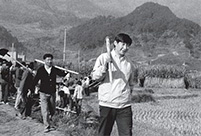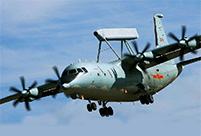 Top 100 beauties in the world!
Top 100 beauties in the world!
 Gallery: Who is the most beautiful one?
Gallery: Who is the most beautiful one?
 If you like autumn, put your hands in the air!
If you like autumn, put your hands in the air!
 Fan Bingbing's "Queen style" in new play
Fan Bingbing's "Queen style" in new play
 Lingerie show at 2014 Miss China
Lingerie show at 2014 Miss China
 J-10 fighters show aerobatic stunts in smog-free sky
J-10 fighters show aerobatic stunts in smog-free sky
 Charming contestants of Shanghai Int’l Model Contest
Charming contestants of Shanghai Int’l Model Contest
 Most amazing chi-pao beauties
Most amazing chi-pao beauties
 7 deadly animal attacks
Russia to launch 70 Proton rockets by 2020: official
7 deadly animal attacks
Russia to launch 70 Proton rockets by 2020: officialUNITED NATIONS, Nov. 21-- A senior UN relief official on Friday concluded her three-day mission to South Sudan, calling on all parties to the conflict to respect their ceasefire commitments and urging the international community to continue providing support to enable humanitarians to scale up and expand critical aid operations, UN spokesman Stephane Dujarric told reporters here.
Kyung-Wha Kang, the UN assistant secretary-general for humanitarian affairs, said: "The level of violence experienced by civilians in South Sudan has been devastating. I was here a year ago and I am heartbroken to see that the promising young country that I saw is suffering so greatly."
"The scale of the needs is great," she said. "However much we scale up our operations, we will never be able to do enough if the conflict continues to destroy lives and livelihoods. All parties to the conflict must show leadership and bring peace to this country."
During her visit, Kang visited communities affected by the crisis in Juba and Jonglei State. She met with government representatives and humanitarian partners to discuss ways of improving access and strengthening protection of civilians, Dujarric said.
She urged parties to respect international humanitarian and human rights laws that clearly call for the protection of civilians and unhindered humanitarian access to people in need.
The year-long conflict in the world's youngest country has been brutal, the UN Office for the Coordination of Humanitarian Affairs (OCHA) said in a press release on Friday, adding that civilians have been killed, raped and beaten; homes torched; lives ruined.
Fighting has destroyed communities and separated families. More than 1.9 million people have fled their homes. More than 100,000 people have sought refuge in UN bases. Millions more fled into the bush and remain too fearful to return home or settle elsewhere.
Despite the extremely difficult situation for aid workers, who face active hostilities, access and logistical challenges, as well as threats to their own lives, the United Nations humanitarian agencies and partners have reached more than 3.5 million people with assistance this year, helped avert famine, and brought under control a deadly cholera outbreak, OCHA said. "However, the situation remains bleak and the number of people who are severely food insecure is projected to increase to 2.5 million people in early 2015."
Aid agencies are planning for next year, and are urgently calling for 600 million U.S. dollars by February to kick-start next year's operations. "In the dry season, we need to pre- position life-saving and livelihood supplies to reach all people in need, and carry out key repairs to roads and airstrips so that we can scale up and expand the aid operation," noted Kang.
Political in-fighting between South Sudanese President Salva Kiir and his former deputy, Riek Machar, started in December 2013 and subsequently turned into a full-fledged conflict.
The violence has left thousands of people dead and more than 1. 8 million displaced, according to the United Nations. Recently, fighting has resumed in Upper Nile and Unity states, causing fear that the humanitarian crisis would be magnified.
 Female soldiers
Female soldiers Celebrity goddesses
Celebrity goddesses  Official trailer of Y-20
Official trailer of Y-20 Photos: Xi Jinping in Fujian
Photos: Xi Jinping in Fujian Standard faces for each countries
Standard faces for each countries China-made military transport aircraft gets ready
China-made military transport aircraft gets ready World Pole Dance Championship in China
World Pole Dance Championship in China 59-year-old Liu Xiaoqing still looks stunning
59-year-old Liu Xiaoqing still looks stunning  Shocking! Photos of Chinese fighters revealed
Shocking! Photos of Chinese fighters revealed Top 10 most dangerous jobs in the world
Top 10 most dangerous jobs in the world  Top 10 fifth generation jet fighters in the world
Top 10 fifth generation jet fighters in the world Top 10 Chinese goddesses
Top 10 Chinese goddesses  Top 20 hottest women in the world in 2014
Top 20 hottest women in the world in 2014 Top 10 pure beauties in showbiz
Top 10 pure beauties in showbiz  Top 10 world's highest-paid models 2014
Top 10 world's highest-paid models 2014 The most gorgeous Chinese women
The most gorgeous Chinese women Top 10 most handsome faces in Asia
Top 10 most handsome faces in AsiaDay|Week|Month